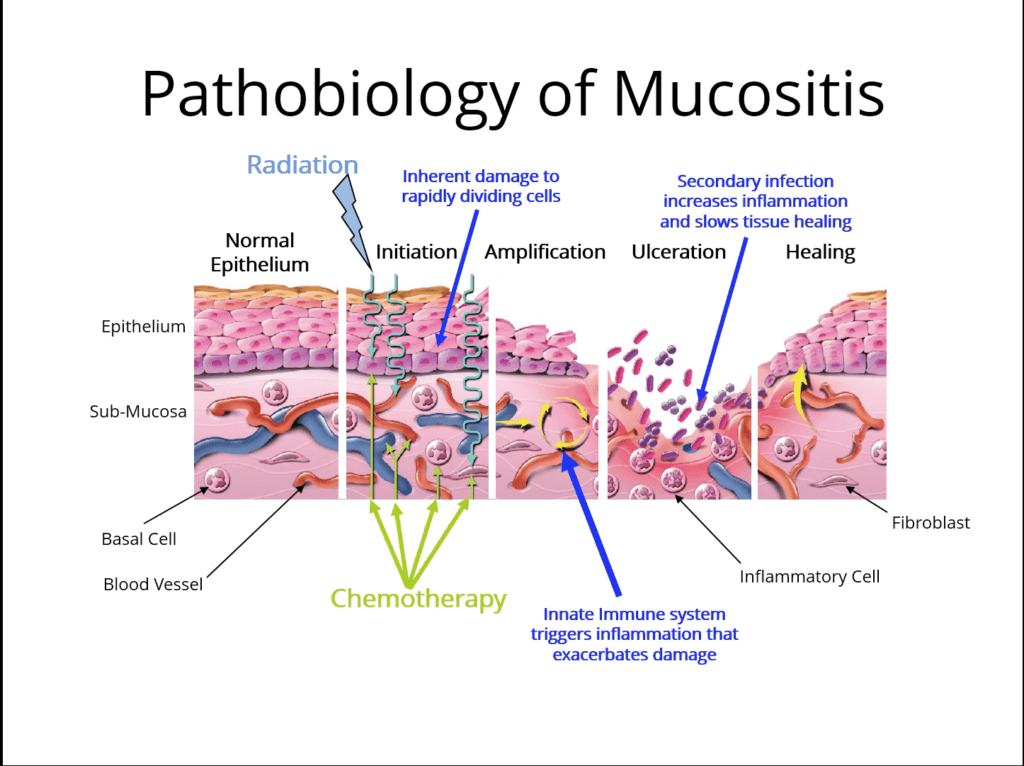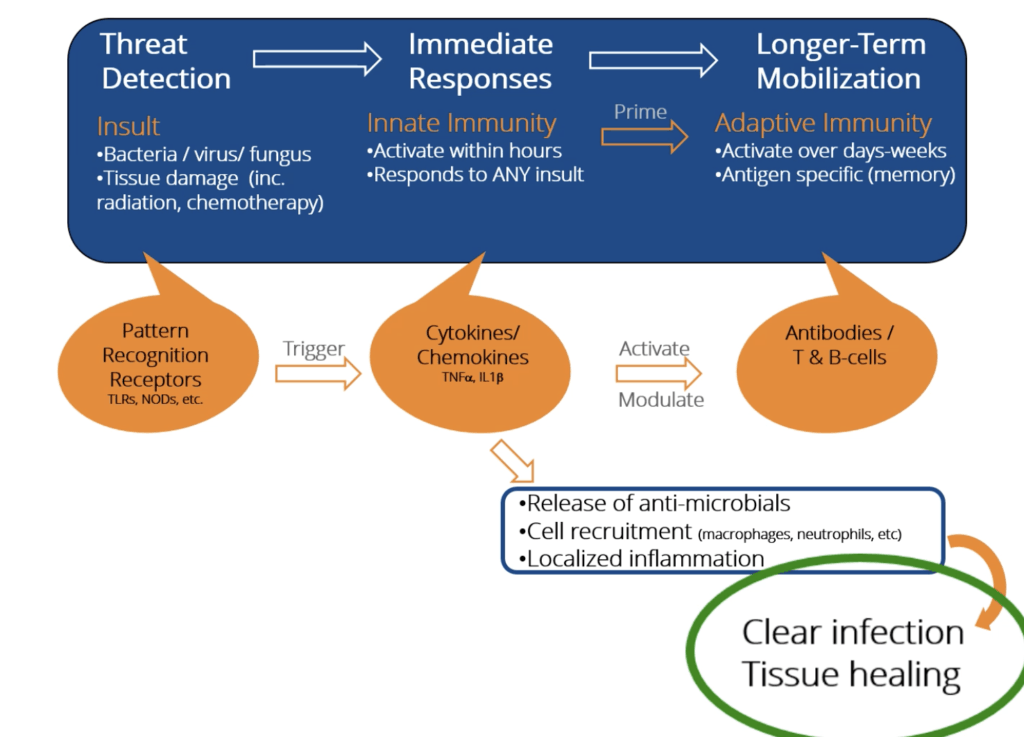
What is Oral Mucositis?
A Debilitating Side Effect of Cancer Treatment
Oral mucositis is a debilitating side effect of cancer radiation or chemotherapy. It commonly occurs in many different cancer treatment regimens and is exacerbated by the response of the innate immune system to the cell death caused by chemotherapy or radiation. Oral mucositis is defined by redness and soreness in the mouth, which at its most severe have open sores which prevent eating and / or drinking (severe oral mucositis). Having severe oral mucositis decreases the likelihood of completing the recommended cancer treatment, and increases the likelihood of experiencing malnutrition, dehydration and serious infections. There are no FDA-approved treatments for oral mucositis for patients with solid tissue tumors.
When Does Oral Mucositis Occur?
Oral mucositis is the result of chemotherapy and radiation causing the cells in the lining of your mouth to get inflamed and/or die, in the worst case resulting in open sores that impact your ability to eat and /or drink.
What Causes Oral Mucositis?
Oral mucositis is caused not only by the damage done by radiation and chemotherapy, but also by the response of your innate immune system to the damage. The inflammatory response of your innate immune system causes the damage to get worse.

What is Innate Immunity?
The innate immune is your rapid response team to deal with immediate threats (infection, wounds, radiation damage, etc.).
- The innate immune system is characterized by many different “damage detectors” (receptors) that people are born with.
- The damage detectors respond immediately (there is no need to wait for the immune system to ‘learn’ anything). This is a primary difference between innate immunity (immediate response) and adaptive immunity (learned response of T-cells and antibodies where the learning process can take days or weeks).
- Triggering the damage detectors launches both inflammatory responses as well as tissue healing and anti-infective responses.
- Regardless of the damage detectors activated, only a few proteins inside the cell are responsible for dictating the immediate response of the innate immune system.

Some Quick Facts About Oral Mucositis
- Oral mucositis occurs in almost every cancer treatment context, with 40% of patients receiving cancer treatment experiencing some degree of oral mucositis
- Severe oral mucositis is defined as an inability to eat and/or drink due to pain and sores in the mouth
- Severe oral mucositis is particularly prevalent in head and neck cancer patients, in patients receiving stem cell transplantation, in non-Hodgkin’s lymphoma and in breast, lung, colon and rectal cancer
- Mucositis also occurs in the intestines following the same general process and includes pain, fecal urgency and diarrhea
Symptoms of Oral Mucositis
The symptoms of oral mucositis include:
- Red, shiny, or swollen mouth and gums
- Blood in the mouth
- Sores in the mouth or on the gums or tongue
- Soreness or pain in the mouth or throat
- Difficulty swallowing or talking
- Feeling of dryness, mild burning, or pain when eating food
- Soft, whitish patches or pus in the mouth or on the tongue
- Increased mucus or thicker saliva in the mouth
Who is at Risk for Oral Mucositis?
About 40% of patients receiving chemotherapy will develop some form of oral mucositis.
Patients given radiation to the head, neck or chest areas are more likely to develop oral mucositis and 75% of head and neck cancer patients develop severe oral mucositis.
Patients given bone marrow or stem cell transplants are also more likely to develop oral mucositis.
Total body irradiation also increases the probability of developing oral mucositis.
The risk of oral mucositis (and the severity of oral mucositis if it does occur) is also increased with:
- Poor oral or dental health
- Smoking
- Using chewing tobacco
- Drinking alcohol
- Dehydration
- Diseases such as kidney disease, diabetes or HIV/AIDS
Oral Mucositis Treatment Options
There is NO FDA-approved drug for oral mucositis for patients with solid tumors.
Recommended treatments include:
- Ice chips (cryotherapy)
- Preventive and supportive dental care
- Strong oral cleaning procedures
- Gels/rinses which coat the surface of the mouth and contain pain medication (for example, MuGard, caphosol, etc.)
Despite these procedures SOM still occurs in large numbers of patients, impacting quality of life, increasing the likelihood of hospital admissions and increasing the likelihood of stopping all anti-cancer treatment, potentially impacting long term survival.
Where Soligenix Comes in
SGX942 is designed to address the underlying causes of mucositis WITHOUT interfering with cancer treatment.
SGX942 is administered as a 4-minute IV infusion, which can be rapidly administered at any point when the patient is otherwise visiting the hospital. Importantly, it does NOT involve oral rinses of an already sore mouth.
SGX942 contains the active ingredient dusquetide, an Innate Defense Regulator that potentially reduces the duration of severe oral mucositis and may also reduce the incidence of infection while aiding in tumor resolution.
Oral Mucositis Scientific Advisory Board
Our scientific advisory board for Oral Mucositis has decades of experience in the biopharmaceutical industry, which includes unique expertise in developing orphan/rare disease therapies. All content on this page has been reviewed by our team of experts.
Helpful Resources
Information on oral mucositis and treatment options is also available at the following sites: